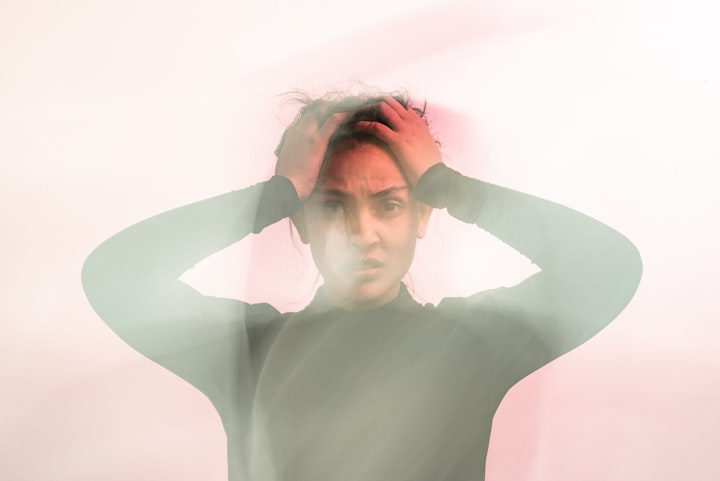Insomnia
Darkness Descends: Understanding and Coping with Anxiety at Night

Anxiety at night, also known as nocturnal anxiety, can be a distressing experience for many people. While some individuals may experience occasional anxiety before bedtime, others may suffer from chronic nocturnal anxiety, which can severely affect their quality of life.
In this article, we will explore the causes of anxiety at night, its symptoms, and some effective ways to manage this condition.
Causes of anxiety at night
Anxiety at night can be caused by a variety of factors, including:
Stressful events: Significant life events such as the loss of a loved one, a breakup, a job loss, or financial difficulties can lead to anxiety and worry, which can be more intense at night.
Sleep disturbances: Disrupted sleep patterns or sleep disorders such as insomnia or sleep apnea can exacerbate anxiety symptoms and cause sleeplessness.
Biological factors: Chemical imbalances in the brain, hormonal changes, and medical conditions such as thyroid disorders, heart disease, or asthma can trigger anxiety at night.
Environmental factors: A noisy or uncomfortable sleeping environment, such as a bright or hot bedroom, can disrupt sleep and cause anxiety.
Symptoms of anxiety at night
Anxiety at night can manifest itself in several ways, such as:
Difficulty falling asleep or staying asleep: Individuals with nocturnal anxiety may find it hard to fall asleep, stay asleep, or wake up frequently during the night.
Racing thoughts: Anxious thoughts and worries can race through the mind, making it challenging to relax and fall asleep.
Physical symptoms: Anxiety can cause physical symptoms such as rapid heart rate, sweating, trembling, and shortness of breath.
Irritability and mood changes: Lack of sleep and anxiety can lead to irritability, mood swings, and decreased ability to concentrate.
Managing anxiety at night
The good news is that anxiety at night can be managed with several effective strategies, such as:
Relaxation techniques: Relaxation techniques such as deep breathing, meditation, yoga, and progressive muscle relaxation can help calm the mind and reduce anxiety.
Cognitive-behavioral therapy (CBT): CBT is a type of talk therapy that can help individuals learn how to manage their thoughts, emotions, and behaviors that contribute to anxiety.
Sleep hygiene: Practicing good sleep hygiene can help improve sleep quality and reduce anxiety. This includes establishing a regular sleep schedule, creating a comfortable sleep environment, avoiding caffeine and alcohol before bedtime, and avoiding electronic devices before bed.
Exercise: Regular physical exercise can help reduce stress and anxiety and improve sleep quality.
Medications for Anxiety at Night
There are several medications available that can help manage anxiety at night. These medications are typically prescribed by a healthcare provider and should be taken under their supervision.
Benzodiazepines
Benzodiazepines are a class of medication that works by enhancing the activity of a neurotransmitter in the brain called gamma-aminobutyric acid (GABA). GABA helps to reduce the activity of the brain, which can help to reduce anxiety. Examples of benzodiazepines include lorazepam (Ativan), diazepam (Valium), and clonazepam (Klonopin).
Benzodiazepines are effective in reducing anxiety symptoms, but they can also cause drowsiness, dizziness, and impaired coordination. They are also known to be habit-forming and can cause withdrawal symptoms if stopped abruptly.
Antidepressants
Antidepressants are a type of medication that is often used to treat depression, but they can also be effective in managing anxiety. Selective serotonin reuptake inhibitors (SSRIs) and serotonin-norepinephrine reuptake inhibitors (SNRIs) are two classes of antidepressants that are commonly prescribed for anxiety.
SSRIs work by increasing the levels of serotonin in the brain, which can help to regulate mood and reduce anxiety symptoms. Examples of SSRIs include fluoxetine (Prozac) and sertraline (Zoloft). SNRIs work by increasing the levels of both serotonin and norepinephrine in the brain, which can also help to reduce anxiety. Examples of SNRIs include venlafaxine (Effexor) and duloxetine (Cymbalta).
Antidepressants can take several weeks to start working, and they may cause side effects such as nausea, headache, and sexual dysfunction.
Melatonin
Melatonin is a hormone that is naturally produced by the body to help regulate sleep-wake cycles. It is available in supplement form and is often used to help manage sleep disturbances. Some studies have also suggested that melatonin may be effective in reducing anxiety symptoms.
Melatonin is generally considered safe, but it can cause dizziness, headache, and nausea. It may also interact with certain medications, so it is important to talk to a healthcare provider before taking melatonin.
Conclusion
Anxiety at night can be a challenging condition to manage, but there are several medications available that can help. Benzodiazepines, antidepressants, and melatonin are all commonly prescribed for anxiety at night, and each has its own benefits and drawbacks. If you are experiencing anxiety at night, it is important to talk to a healthcare provider to determine the best treatment plan for you.
About the Creator
dmohan kumar
I am a freelance article writer, sql developer from India. My hobby is to practice small programs, read, watch videos to learn more.
I was working in a Pharma company since past 5 years, before that I used to work in call centers for 2years.





Comments
There are no comments for this story
Be the first to respond and start the conversation.